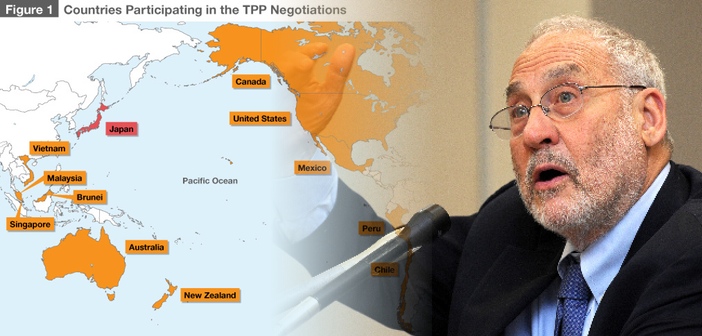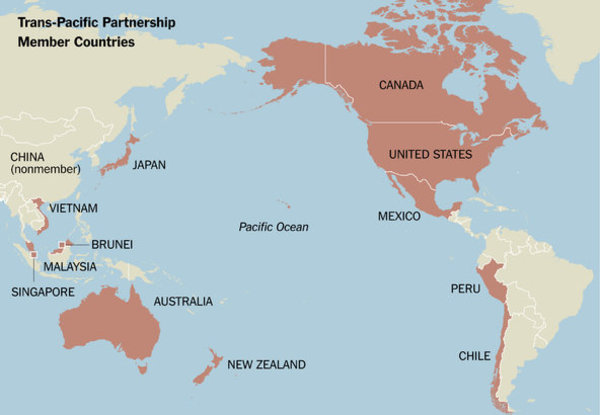On the Wrong Side of Globalization – Prescription for Betterment of Global Economy
Professor Joseph Stiglitz has criticizes the TPP. As read in the article, it appears that “the TPP talks have stalled.” Reading what Professor Stiglitz writes, however, it seems that he has not found an answer to the question of how to change the world economy for the better.
Using a simple example, I can illustrate
the current economy as follows. The
fruit of the people’s hard work is stolen by a very small number of big
business managers, politicians and bureaucrats who collude with one
another. How do they do? It’s very simple: such managers show favoritism
to politicians and bureaucrats by bribery, have them change the law to the
advantage of big companies and steal wealth from the people in the form of
tax. One such example is consumption tax
increase and refund tax applied to exporting companies.
They get richer with the wealth they have taken
away from the people without making any management effort and furthermore dabble
in gable (stock speculation) to build up wealth. Only a handful of the wealthy who keep on
succeeding in gambling build enormous wealth in this manner. Since they are acquitted with the government
insiders and trust their property to brilliant investors like George Soros,
they have very few risks of losing a bet.
Even if losing it, they are bailed out by the government and they are
practically free from any defeat. Like
this, they siphon wealth from the people.
It is hardly possible that such economy
will last forever. All we have to do to
create a booming economy is just to confiscate the income they illegally gained
and give it back to the people. How can
we do to prevent them from gaining such unfair income? The first thing we have to do is to fix the
maximum wage.
Could anyone on good
terms with Professor Stiglitz tell him about the above-mentioned very simple
prescription?
Masatoshi
Takeshita
May
23, 2014
Excerpt from a Japanese article: GendaiBusiness – April 21, 2014 –
On
the Wrong Side of Globalization by Joseph Stiglitz
12 Trans-Pacific Partnership Member
Countries [Photo] The New York Times
Source:
Trade agreements are a subject that
can cause the eyes to glaze over, but we should all be paying attention. −−—−−
−−−−−− Most immediately at issue is the
Trans-Pacific Partnership, or TPP, which would bring together 12 countries
along the Pacific Rim in what would be the largest free trade area in the
world.
Negotiations for the TPP began in 2010, for the purpose, −−−−− , of
increasing trade and investment, through lowering tariffs and other trade
barriers among participating countries. −−−−−
Controversy has erupted, and
justifiably so. Based on the leaks — and the
history of arrangements in past trade pacts — it is easy to infer the shape of
the whole TPP, and it doesn’t look good. There is a real risk that it will benefit the wealthiest sliver of the American and
global elite at the expense of everyone else. −−−−− .
Let’s tackle the history first. In
general, trade deals today are markedly different from those made in the
decades following World War II, when negotiations focused on lowering tariffs. −−−−− .
Today, the purpose of
trade agreements is different. Tariffs around the world are already low. The
focus has shifted to “nontariff barriers,” −−−−− . Huge
multinational corporations complain that inconsistent regulations make business
costly. But most of the regulations, even if they are imperfect, are there for a reason: to protect workers, consumers, the
economy and the environment.
What’s more, those regulations were
often put in place by governments responding to the democratic demands of their
citizens. −−−−− But when corporations call for harmonization, what they really mean is
a race to the bottom.
−−−−− . Corporations everywhere may well
agree that getting rid of regulations would be good for corporate profits.
Trade negotiators might be persuaded that these trade agreements would be good
for trade and corporate profits. But there would
be some big losers — namely, the rest of us.
−−−−− . All over the world, trade
ministries are captured by corporate and financial interests. And when
negotiations are secret, there is no way that the democratic process can exert
the checks and balances required to put limits on the negative effects of these
agreements.
−−−−− . One of the
worst is that it allows corporations to seek
restitution in an international tribunal, not only for unjust
expropriation, but also for alleged diminution of
their potential profits as a result of regulation. −−−−− Philip Morris has already tried this
tactic against Uruguay,−−−−− . In this sense, recent
trade agreements are reminiscent of the Opium Wars,−−−−− .
−−−−− . Developing
countries pay a high price for signing on to these provisions, but the
evidence that they get more investment in return is scant and controversial.
And though these countries are the most obvious
victims, the same issue could become a problem for the United States, as
well. American corporations could conceivably create a
subsidiary in some Pacific Rim country, invest in the United States through
that subsidiary, and then take action against the United States government —
getting rights as a “foreign” company that they would not have had as an
American company. Again, this is not just a theoretical possibility:
There is already some evidence that compnanies are choosing hot to funnel their
money into different countries on the basis of where their legal position in
relation to the government is strongest.
There are other noxious provisions.
America has been fighting to lower the cost of health care. But the TPP would make the introduction of generic drugs more
difficult, and thus raise the price of medicines. In the poorest countries,
this is not just about moving money into corporate coffers: thousands would die
unnecessarily. -----. Trade agreements provide even more opportunities for
patent abuse.
The worries mount. One way of
reading the leaked negotiation documents suggests that the TPP would make it
easier for American banks to sell risky derivatives around the world, perhaps
setting us up for the same kind of crisis that led to the Great Recession.
In spite of all this, there are
those who passionately support the TPP and agreements like it, including many
economists. What makes this support possible is bogus, debunked economic
theory, which has remained in circulation mostly because it serves the
interests of the wealthiest.
-------------------- .
American politics today compounds
these problems. Even in the best of circumstances, the old free trade theory
said only that the winners could compensate the losers, not that they would.
And they haven’t — quite the opposite.-----
.
Critics of the TPP are so numerous
because both the process and the theory that undergird
it are bankrupt. Opposition has blossomed not just in the United States,
but also in Asia, where the talks have stalled.
----- .Those who see trade
agreements as enriching corporations at the expense of the 99 percent seem to
have won this skirmish. But there is a broader war to ensure that trade
policy — and globalization more generally — is designed so as to increase the
standards of living of most Americans. The outcome of that war remains
uncertain.
In this series, I have repeatedly
made two points: The first is that the high level of
inequality in the United States today, and its enormous increase during
the past 30 years, is the cumulative result of an array of policies, programs
and laws. -----. Agreements like the TPP have
contributed in important ways to this inequality. Corporations may profit,
and it is even possible, though far from assured, that gross domestic product
as conventionally measured will increase. But the
well-being of ordinary citizens is likely to take a hit.
And this brings me to the second
point that I have repeatedly emphasized: Trickle-down
economics is a myth. Enriching corporations — as the TPP would — will not necessarily help
those in the middle, let alone those at the bottom.

